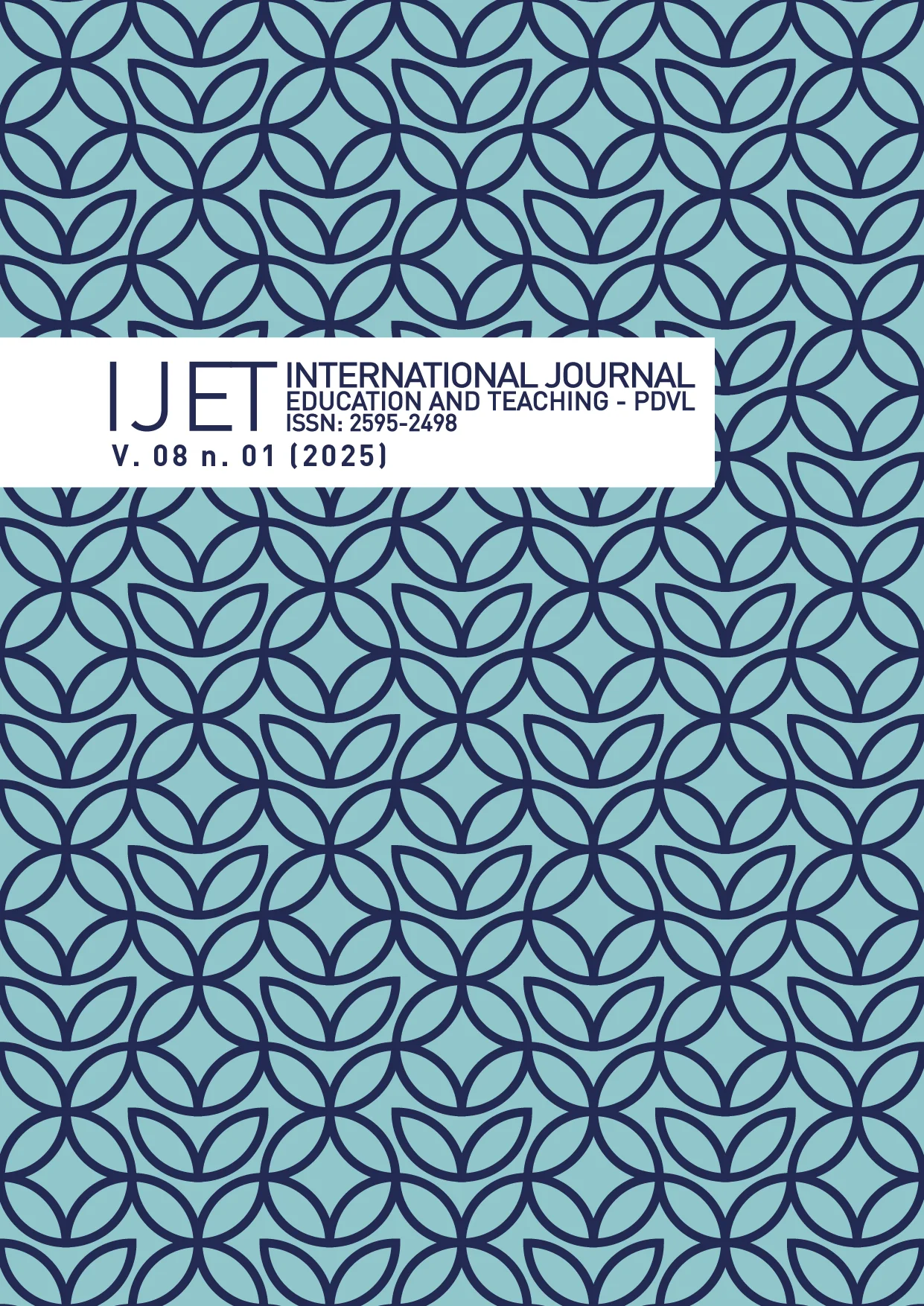Júri Simulado e Agrotóxicos: conectando ciência, ética e cidadania no ensino
DOI:
https://doi.org/10.31692/2595-2498.v8i1.155Palavras-chave:
Agrotóxicos, Atividades Lúdicas, Ensino de CiênciasResumo
Este estudo investiga o uso do júri simulado, abordando a temática dos agrotóxicos e promovendo reflexões sobre ciência, ética e cidadania. Realizado em uma Escola de Referência no agreste de Pernambuco, o trabalho envolveu estudantes do 2º ano do Ensino Médio. A pesquisa, de abordagem qualitativa e caráter descritivo, utilizou observação direta e registro em vídeo para coleta de dados, o júri foi estruturado em três etapas. Os resultados mostraram que o júri simulado engajou os estudantes em debates críticos e colaborativos, promovendo o desenvolvimento de habilidades como argumentação ética, pensamento crítico e expressão oral. A vitória da acusação, enfatizou os riscos do uso inadequado e a falta de informação na comercialização, reforçou a relevância de regulamentações mais eficazes e de uma conscientização ampla sobre o tema. Conclui-se que o júri simulado é uma ferramenta pedagógica valiosa para conectar conteúdos científicos com questões éticas e sociais, incentivando os estudantes a se tornarem protagonistas do processo de aprendizagem. Além de favorecer o engajamento e o pensamento crítico, a atividade permitiu a integração entre conhecimento acadêmico e problemas reais, preparando os alunos para agir como cidadãos conscientes e comprometidos com a sustentabilidade e o bem-estar coletivo.
Downloads
Referências
ARANHA, M. L. A. Formação do Educador. In: Filosofia da Educação. 3 ed. rev. ampl. . São Paulo: Editora Moderna, 2006.
BARBOZA, R. J. O. Energeia: um jogo pedagógico para abordagem do conceito de energia a partir da teoria dos perfis conceituais. 2020. Dissertação (Mestrado em Educação em Ciências e Matemática) - Universidade Federal de Pernambuco, Caruaru, 2020. DOI: https://doi.org/10.29327/269504.3.4-11
BRASIL. Instituto Nacional de Estudos e Pesquisas Educacionais Anísio Teixeira (Inep). Notas sobre o Brasil no Pisa 2022. Brasília, DF: Inep, 2023.
BRASIL. Lei nº 7802, de 11 de julho de 1989. Diário Oficial da União. 11 jul 1989.
CRUZ, M. E. B. Sequência Didática Baseada na Resolução de Problemas para o ensino de conteúdos de Química Orgânica: uma análise a partir da Teoria da Atividade de Leontiev. 2016. Dissertação (Mestrado em Ensino das Ciências) – Universidade Federal Rural de Pernambuco, Recife. 2016.
CUNHA, M. B. Jogos no Ensino de Química: Considerações Teóricas para sua Utilização em Sala de Aula. Revista Química Nova na Escola. v. 34, n. 2, p. 92-98, 2012.
DEWEY, J. Experience and Education. New York Macmillan Company, 1938.
FREIRE, P. Pedagogia do Oprimido. Rio de Janeiro: Paz e Terra, 1981.
LOPES, C. V. A.; ALBUQUERQUE, G. S. C. Agrotóxicos e seus impactos na saúde humana e ambiental: uma revisão sistemática. Saúde Debate. Rio de Janeiro, v. 42, n. 117, p. 518-534, abr-jun 2018. DOI: https://doi.org/10.1590/0103-1104201811714
LÜDKE, M.; ANDRÉ, M. E. D. A. Pesquisa em Educação: Abordagens Qualitativas. 2. ed. Rio de Janeiro: E.P.U., 2018.
MENESES, F. M. G.; NUÑEZ, I. B. Erros e dificuldades de aprendizagem de estudantes do ensino médio na interpretação da reação química como um sistema complexo. Ciênc. Educ., Bauru, v. 24, n. 1, p. 175-190, 2018. DOI: https://doi.org/10.1590/1516-731320180010012
MINAYO, M. C. S. Pesquisa Social: teoria, método e criatividade. Petrópolis: Vozes, 2009
MORTIMER, E. F. Construtivismo, mudança conceitual e ensino de ciências: para onde vamos? Investigações em Ensino de Ciências. Porto Alegre, v. 1, p.20-39, 1996.
OLIVEIRA, M. M. Como fazer pesquisa qualitativa. 7. ed. Petrópolis, RJ: Vozes, 2016.
PIAGET, J. A Epistemologia Genética. Rio de Janeiro: Zahar, 1970.
ROCHA, J. S.; VASCONCELOS, T. C. Dificuldades de aprendizagem no ensino de química: algumas reflexões. XVIII Encontro Nacional de Ensino de Química (XVIII ENEQ) Florianópolis, SC, 2016.
SADALLA, A. M. F. A.; LAROCCA, P. Autoscopia: um procedimento de pesquisa e de formação. Educação e Pesquisa, São Paulo, v. 30, n. 3, p. 419-433, set./dez. 2004. DOI: https://doi.org/10.1590/S1517-97022004000300003
SANTANA, V. S.; MOURA, M. C. P.; NOGUEIRA, F. F. Mortalidade por intoxicação ocupacional relacionada a agrotóxicos, 2000-2009, Brasil. Rev. Saúde Pública. [internet]. 2013 [acesso em 2024 dez 1]; 47(3):598-606. Disponível em: http://www. scielo.br/scielo.php?script=sci_arttext&pid =S0034-89102013000300598. DOI: https://doi.org/10.1590/S0034-8910.2013047004306
SILVA, A. C. R., LACERDA, P. L., CLEOPHAS, M. G. Jogar e compreender a Química: ressignificando um jogo tradicional em didático. Amazônia - Revista de Educação em Ciências e Matemática, v.13, n. 28, p.132-150, 2017. DOI: https://doi.org/10.18542/amazrecm.v13i28.4340
VYGOTSKY, L.S. Mind in Society. Cambridge, MA. Harvard University Press. 1978.
YIN, R. K. Pesquisa Qualitativa do início ao fim. Tradução de Daniel Bueno. 2. ed. Porto Alegre: Penso, 2016. 313 p.

Downloads
Publicado
Edição
Seção
Licença
Copyright (c) 2025 Gabriela Rejane Silva de Medeiros, Ayrton Matheus da Silva Nascimento (Autor)

Este trabalho está licenciado sob uma licença Creative Commons Attribution 4.0 International License.





